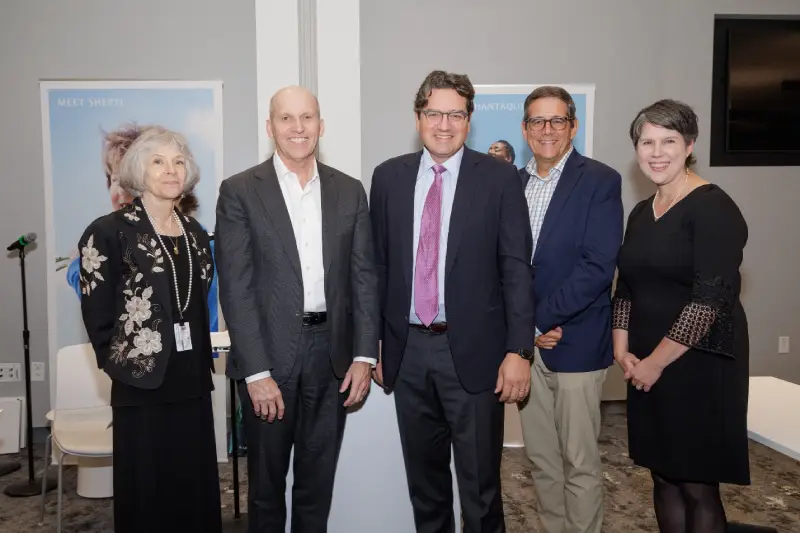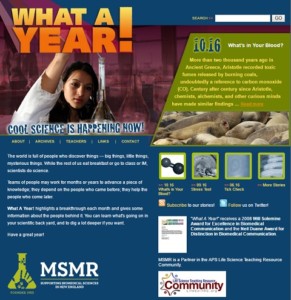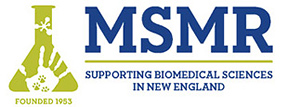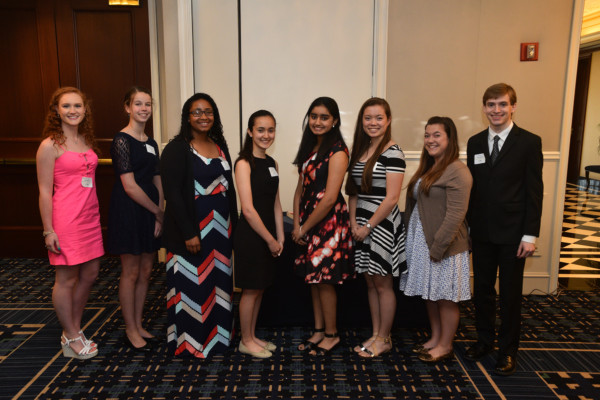Massachusetts Society for Medical Research honors academic, government and business leaders during annual event
10/27/25 (North Chelmsford, Mass.) – In 2006, the Massachusetts Legislature designated October 21 as Massachusetts Biomedical Research Day, to recognize the contributions biomedical research makes to the health and well-being of the citizens of the Commonwealth and people around the world, as well as the many positive impacts that biomedical research has on the region’s economy and reputation. Each year, the Massachusetts Society for Medical Research – the nation’s oldest regional non-profit organization supporting biomedical research – celebrates by honoring those individuals or institutions from across New England who have made significant contributions to the field.
On October 24, the following individuals were honored during the 2024 Biomedical Research Day celebration and honors luncheon, held at Bristol Myers Squibb in East Cambridge, Mass.
The honorees were chosen by the MSMR Board of Directors for their contributions in one of four fields: Investigator, Educator, Business Leader and Government Leader.
The 2025 honorees include:
Investigator – Dr. Giovanni Traverso, Director of the Laboratory for Translational Engineering at MIT and Harvard
Prof. Giovanni Traverso is the Director of the Laboratory for Translational Engineering at MIT and Harvard. He is an Associate Professor in the Department of Mechanical Engineering at MIT, Associate Member of the Broad Institute and a gastroenterologist in the Division of Gastroenterology at Brigham and Women’s Hospital, Harvard Medical School where his early research led to the development of Cologuard, the first FDA-approved non-invasive test for colon cancer screening. During his postdoctoral work at MIT, he advanced new technologies for drug delivery and physiological sensing via the gastrointestinal tract. His current research focuses on developing next-generation therapeutic delivery systems for the gastrointestinal tract and novel ingestible electronic devices for sensing a wide range of physiological and pathophysiological parameters.
Dr. Traverso earned his BA from Trinity College, University of Cambridge, and his Ph.D. from Johns Hopkins University, before completing medical school at the University of Cambridge, internal medicine residency at Brigham and Women’s Hospital and gastroenterology fellowship at the Massachusetts General Hospital.
Educator (co-awardees) – Dr. Margaret Livingstone, Professor of Neurobiology at Harvard Medical School and Dr. Agnes Lacreuse, Professor in the Department of Psychological and Brain Sciences at the University of Massachusetts Amherst
Dr. Margaret Livingstone is Professor of Neurobiology at Harvard Medical School. She has done research on hormones and behavior, learning, dyslexia, and vision. Dr. Livingstone has explored the ways in which vision science can understand and inform the world of visual art. She has written a popular lay book, Vision and Art, which has brought her acclaim in the art world as a scientist who can communicate with artists and art historians, with mutual benefit. She generated some important insights into the field, including a simple explanation for the elusive quality of the Mona Lisa’s smile (it is more visible to peripheral vision than to central vision) and the fact that Rembrandt, like a surprisingly large number of famous artists, was likely to have been stereoblind which is the inability to perceive depth or 3D space.
Dr. Livingstone received her undergraduate degree from MIT and Ph.D. from Harvard University.
Dr. Agnes Lacreuse is Professor in the Department of Psychological and Brain Sciences, a member of the Neuroscience and Behavior Graduate Program, the Initiative of Neurosciences, and Center for Neuroendocrine Studies at the University of Massachusetts Amherst. Her distinguished career has been dedicated to advancing our understanding of neurocognitive aging, with a specific focus on sex differences, Alzheimer’s disease, and women’s health. She studies nonhuman primates to better understand neurocognitive aging and pathological aging processes, such as those involved in Alzheimer’s disease (AD). Additionally, her work aims to develop new treatments that would safely alleviate severe side effects associated with breast cancer to help survivors live a better life.
Dr. Lacreuse received her Ph.D. from Universite Paul Sabatier, Toulouse, France.
Business Leader – Bill Sibold, CEO, Madrigal Pharmaceuticals
Mr. Bill Sibold has more than 30 years of experience in the biopharmaceutical industry and is currently the President & CEO of Madrigal Pharmaceuticals. Prior to joining Madrigal, he served as Executive Vice President, Specialty Care of Sanofi and President, Sanofi North America, where he led a global organization of approximately 10,000 employees across five specialty therapeutic areas and served as a member of the Sanofi Executive Committee. Previously, Mr. Sibold served as Chief Commercial Officer of Avanir Pharmaceuticals, and Senior Vice President U.S. Commercial for Biogen. He also served on the Executive Committee of BIO. Bill joined Madrigal as their CEO in 2023 and has launched the first approved treatment for metabolic dysfunction-associated steatohepatitis a highly prevalent yet underdiagnosed liver disease in patients with other health issues including obesity and type 2 diabetes.
Bill received his BA in Molecular Biophysics and Biochemistry from Yale University and his MBA from Harvard Business School.
Government Leader – Maura Healey, 73rd Governor of Massachusetts
In her first year as Governor, Healey has already delivered on key promises to help Massachusetts become a leader in clean energy, a more affordable and equitable place to live, and a great place for businesses to operate. During her tenure, Governor Healey has already delivered on key promises to help Massachusetts become a leader in clean energy, a more affordable and equitable place to live, and a great place for businesses to operate. Gov. Healey is an outspoken advocate for the life science sector in the state and has been strong in fighting back against Trump administration cuts to federal research funding. And in November 2024, Gov Healey signed the $4 billion Mass Leads Act, to invest in Massachusetts businesses, create good jobs, and keep the state’s innovation economy the best in the world.
Healey attended Harvard College, where she captained the basketball team, and then spent two years as a 5’4” starting point guard on a professional basketball team in Austria.

Dr. Margaret Livingstone, Bill Sibold and Dr. Giovanni Traverso (left to right) accept their 2025 MSMR Biomedical Research Day awards in the category of Educator, Business Leader and Investigator, respectively from MSMR Board Chairman William Barbo and MSMR President, Aimee Christian, Ph.D. [Not pictured: Dr. Agnes Lacreuse, Educator (co-awardee) and Governor Maura Healey (Government Leader)]
ABOUT MSMR: Founded in 1953, the Massachusetts Society for Medical Research (MSMR) is a non-profit organization supporting biomedical sciences across New England. MSMR represent the colleges, universities, hospitals, biotechnology firms, pharmaceutical companies and others located throughout the region that conduct the medical research that leads to the discovery of new life saving medications, medical devices and new health care treatment protocols. It is the nation’s oldest state-based non-profit association serving the biomedical research community.
For more information, visit the MSMR website.

THURSDAY, APRIL 26, 2018
BOSTON PARK PLAZA HOTEL
50 PARK PLAZA AT ARLINGTON STREET,
BOSTON, MA 02116-3912
12:30 PM REGISTRATION
Workshops begin at 1:00 pm and end at 5:00 pm
CLICK HERE FOR THURSDAY AGENDA
POSTER COMPETITION
2018 MSMR ENRICHMENT SYMPOSIUM POSTER COMPETITION
APRIL 27, 2018
BOSTON PARK PLAZA
50 PARK PLAZA at ARLINGTON STREET
Boston, MA
Subject: We are seeking colorful and informative posters covering aspects of enrichment used with any laboratory animal species. Accepted posters will be displayed at the TENTH Annual MSMR Enrichment Symposium: All Creatures Big and Small … Animal Enrichment in a Laboratory Environment on April 27, 2018.
The poster award recipient(s) will demonstrate how (a) enrichment concepts are utilized, (b) living environments are enhanced, (c) research is positively impacted with welfare improvements, and/or (d) stress is reduced in the laboratory animals. This critical information must be conveyed in a clear, concise and professional manner. The poster cannot be for commercial advertisement or soliciting sales of a product.
Poster Size: 2’ x 3’ Submit as PDFs: winners will be asked to provide a version mounted on foam board for display at the Symposium
Submission details: Posters should be submitted as PDF files in two versions: one version with all author and contact information and one blind judging version without any author or contact information. Deadline for submission is March 23, 2018.
Email your PDFs as attachments to msmrposters@msmr.org.
In the body of the e-mail include your name, institution, telephone number and poster title as well as your collaborators’ names, titles, and institutions.
Posters will be judged on the following criteria:
- Relevance
- Does the enrichment promote species appropriate behavior, improved welfare, and/or better understanding of behavior?
- Metrics
- Are metrics available to support the findings?
- Impact & Innovation
- What is the overall future or continuing impact on the broader scientific community of the innovations and/or efforts? Are the data novel; does this work contribute to basic knowledge of animal behavior/welfare?
- Potential for broad adoption
- Can the enrichment be widely adopted?
- Technical Spec: Here are the required* and suggested elements for your poster –
- Title*
- Authors*
- Institutional Affiliation*
- Abstract – a brief abstract, up to 200 words*
- Background (if applicable)
- Materials and Methods (if applicable) If your poster is about construction of a novel device, please be sure to include pictures of the device!
- Results
- Conclusions*
- References (if applicable)
Submission deadline: March 23, 2018
Notification: Applicants will be notified of acceptance by e-mail. Accepted posters will be displayed at the Enrichment Symposium.
The poster award recipient will receive a certificate and a $250 honorarium, generously donated by BioServ.
What A Year! for middle and high school students and teachers
What A Year! explains a biomedical research breakthrough each month of the school year and gives some information about the people behind it. You can learn what’s going on in your scientific back yard, and to dig a lot deeper if you want.
Right now, someone is announcing a new insight or a new discovery that could have a huge impact on all of us. Guaranteed.
The news doesn’t always make it onto TV or newspapers. Even finding it on the Internet is hard sometimes. And then it’s presented for the benefit of other scientists, not students in middle and high school.
 The mission of What A Year! is to bring you great news in biomedical research in a way that you can appreciate and understand.
The mission of What A Year! is to bring you great news in biomedical research in a way that you can appreciate and understand.
Each month we’ll put a new story here. What kind? Something that opens a whole new window on human or animal life. Or, something that might, after more research and development, lead to a cure for an illness, or a new way to treat a medical condition.
Dana-Farber’s William Kaelin, Jr. wins 2016 Lasker Award for Basic Medical Research
The 2016 Albert Lasker Basic Medical Research Award honors three physician-scientists for their discovery of the pathway by which cells from human and most animals sense and adapt to changes in oxygen availability, a process that is essential for survival. Scientists had long appreciated that the success of today’s dominant life forms hinges on oxygen, yet little was known about their responses to it. William G. Kaelin, Jr. (Dana-Farber Cancer Institute/Harvard Medical School),Peter J. Ratcliffe (University of Oxford/Francis Crick Institute), and Gregg L. Semenza (Johns Hopkins University School of Medicine) illuminated the core molecular events that explain how almost all multicellular animals tune their physiology to cope with varying quantities of the life-sustaining element, thus exposing a unique signaling scheme.
MSMR’s 25th Annual Student Competition Winners
MSMR’s 25th Annual Student Competition
January 5 – May 9, 2016
Reflecting What A Year! A Year of Science Discoveries
A Student Essay, Poster or Webpage Competition !
Our winners were announced and awarded at the MSMR Annual Meeting of Members Luncheon on June 24th at the Colonnade Hotel. They are:
| Jocelyn Koelb NH – Home School |
1st Place Middle School |
Essay: Brain Organoids: An In Vitro Breakthrough |
| Melissa Mello MA – Norfolk County Agricultural High School |
1st Place Tie |
Website: Bio-Inspired Coating Repels Blood and Bacteria |
| Ryan LaPointe MA – Mass. Academy of Math and Science |
1st Place Tie |
Website: Brainprint |
| J’Lise Potter CT – Science and Technology Magnet High School |
2nd Place |
Poster: Melt Away Cataracts |
| Aarushi Pendharkar MA – Mass. Academy of Math and Science |
3rd Place Tie |
Website: Optogenetics Suppresses Tumor Growth |
| Tal Usvyatsky MA – Mass. Academy of Math and Science |
3rd Place Tie |
Poster: Discoveries in Heart Disease |
| Emily Wysocki MA – Norfolk County Agricultural High School |
Honorable Mention |
Website: Researchers Transplant Bioengineered Rat Forelimb |
| Heather Wing MA – Mass. Academy of Math and Science |
Honorable Mention |
Poster: The Cure for Obesity |
|
Pariya Prama |
Honorable Mention |
Poster: Modification of Leukemia Cells Into Leukemia-killing Immune Cells |




